English Words in Action, Group P
(a variety of English words which have developed through history and are currently used in our modern age)
Simply click on this banner (or the following link) and you will be on your way to stimulate your brain for greater word comprehension with quizzes based on some of the words in this unit.
2. An easy or slow walk that a horse makes while going somewhere: The rider guided the horse as it moved at an easy pace towards the racetrack.
3. The rate at which something or someone moves towards a goal or completion of an undertaking: The work progressed at a slow pace partly because of the hot weather.
2. To move in a slow, casual, manner; to saunter or to amble: The horses paced around the ring during the circus performance.
2. To reduce, or to ease the manifestations of anger or unrest: The king pacified the mob with promises of reform.
3. To cause someone, who is angry or upset, to become quiet or calm: Tabitha tried to pacify her crying child.
4. Etymology: from Latin pacificare, "to make peace"; from pax, "peace" + facere, "to make".
Marge and George made a pact to go to the fitness studio at least two times a week.
2. Etymology" from Latin pactus, "agreed". This is derived from pacisci, "to make a covenant". Pact is also related to Latin pax, "peace".Some historians say that the idols of pagans were destroyed by Christian missionaries.
Some religious people are convinced that unreligious and atheistic people are pagans.
2. Etymology: from Latin paganus, "rustic, peasant" and is derived from Latin pagus, "the country, rural district".From the second century on, Latin paganus had the additional meaning of "civilian, non-soldier". Early Christians were said to be fond of military metaphors, regarding themselves as "soldiers of Christ"; so, they applied the "non-soldier" word, or "heathen", to those who had not enlisted in the Church as "soldiers".
2. Etymology: from French paladin, from Italian paladino, from Latin palatinus, "officer" of the palace.
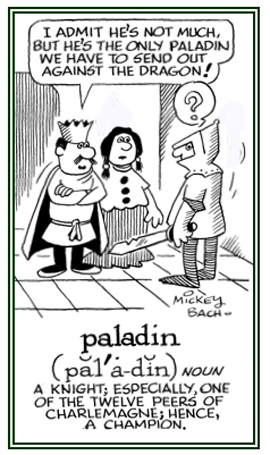
Go to this Word A Day Revisited Index
so you can see more of Mickey Bach's cartoons.
2. Descriptive of something as trifling, insignificant, or of no consequence: The politician dismissed the statements made by his opponent as of paltry significance.
3. Etymology: it has been suggested that this adjective paltry was borrowed from Low German or East Frisian paltrig, "ragged, torn" and derived from palte, "rag".

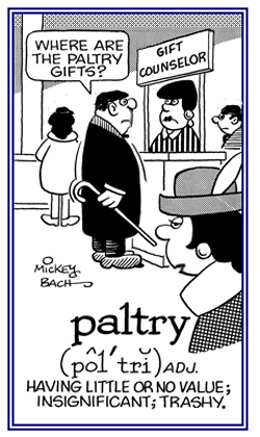
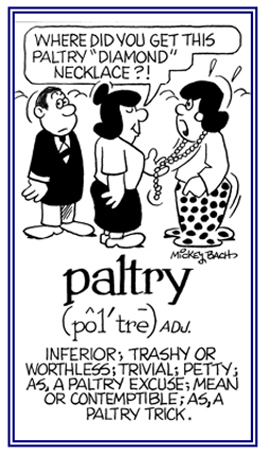
Go to this Word A Day Revisited Index
so you can see more of Mickey Bach's cartoons.
2. Etymology: borrowed from Portuguese paria, "drummer" from parai, "large festival drum".
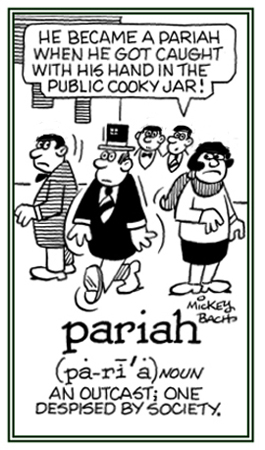
Go to this Word A Day Revisited Index
so you can see more of Mickey Bach's cartoons.
2. Descriptive of being frugal and thrifty: Because the elderly couple was parsimonious, they did not need to ask for financial aid from their children or other relatives.
3. Etymology: from Latin parcimonia, from parcere, "to spare" + –ous, "having the quality of".
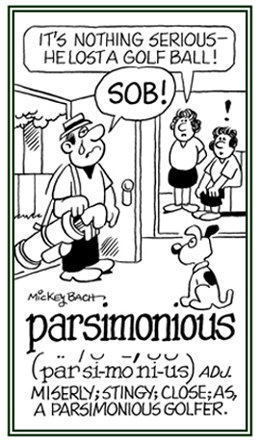

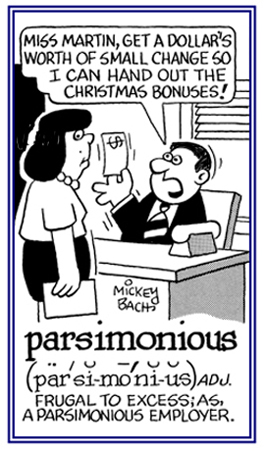
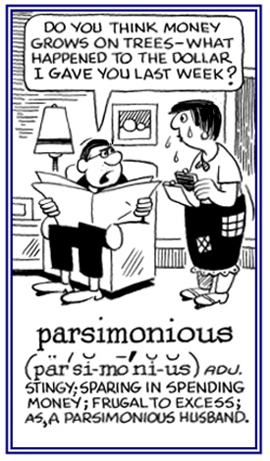
Go to this Word A Day Revisited Index
so you can see more of Mickey Bach's cartoons.
Donald Trump's usage of social media has attracted attention worldwide and the main coverage has been about his tweets regarding various subjects, after he joined the social networking site Twitter in March, 2009.
Trump has frequently used Twitter and other social media platforms to make comments, or pasquinades about other politicians, celebrities and the daily news media.
The attention on Trump's Twitter activity has significantly increased since he was sworn in as the 45th President of the United States and has continued to post his controversial pasquinades of opinions and statements.
2. Etymology: from the late 16th century; Italian pasquinata, "the name of a statue in Rome on which abusive Latin verses were posted annually".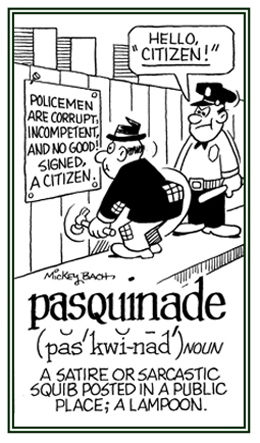
Go to this Word A Day Revisited Index
so you can see more of Mickey Bach's cartoons.
The word pasteurization refers to the process originated by Louis Pasteur in which milk or another liquid is heated to a specified moderate temperature for a set period of time; for example, to 60 degrees centigrade for 30 minutes, in order to kill pathogenic bacteria and to delay the growth of other harmful germs.
2. Etymology: Named after the French chemist and bacteriologist, Louis Pasteur (1822-1895), whose name has been immortalized in the word pasteurize.
Pasteur's discovery of a method for checking excessive fermentation and reducing disease in such liquids as wine, beer, and milk by pasteurizing them with heat has revolutionized the French wine and beer industries.
As a result, dairy products which are being pasteurized continue to save the lives of many thousands of milk drinkers and the consumers of foods made from milk; such as, cheese, butter, ice cream, etc.
2. A pad or a shield worn over a sightless or injured eye: Captain Hook in Peter Pan wore a patch over one of his eyes.
3. A small piece of computer code that is inserted into a program in order to improve its functioning or to correct an error: A computer patch can be added to software in order to fix a bug; especially, as a temporary correction between two releases.
4. An adhesive piece of drug impregnated material that is worn on the skin so the drug can be absorbed gradually over time: Frank's wife wanted to know why he had so many patches on his skin and he told her, "This patch makes me stop smoking, this one makes me eat less, this one reminds me to put my clothes in the hamper instead of leaving them on the floor, and this last one helps me to remember to put the toilet seat back down."
5. A small piece of ground; especially, one that is used for gardening: Max and Mary spend some time each day taking care of their vegetable patch in their back yard.
2. Something that is put over a wound or an injury to help the healing process: Monroe's doctor told him that he should patch his mouth shut whenever he felt the need to smoke in order to help him stop smoking.
2. Cloth that consists of different colors and shapes which are sewn together in patterns: Mike's mother was working on the patchwork of the bedspreads for his two children.
Links to all of the groups of English words in action, Groups A to Z.
You may see the bibliographic list of sources of information for these words in action.

